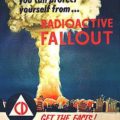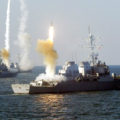The Department of Defense has just released its new National Defense Strategy. In essence, it formally announces that the cold war is back in full swing, with a disturbing difference: this time, U.S. enemies extend far beyond just Moscow. To add to the bleak portrayal, the nation’s adversaries have dramatically lessened the U.S. technological advantage.
In a significant turnaround from recent years, it states that traditional great-power rivalry, rather than terrorism, is the major threat. According to the document, “The central challenge to U.S. prosperity and security is the reemergence of long-term, strategic competition by what the National Security Strategy classifies as revisionist powers. It is increasingly clear that China and Russia want to shape a world consistent with their authoritarian model—gaining veto authority over other nations’ economic, diplomatic, and security decisions.”
It provides explicit examples:
China, (which has increased its military spending at a percentage pace greater than either the U.S. or the U.S.S.R at the height of the Cold War) has both utilized predatory economics to intimidate its neighbors, and militarized the South China Sea.
Russia has engaged in a dramatic nuclear and conventional arms buildup, at a time when the U.S. cut back on its own defense spending. It has violated the borders of nearby nations. The report notes that Moscow pursues “veto power over the economic, diplomatic, and security decisions of its neighbors.”
Moscow and Beijing are not alone in the unwelcome new environment. The report breaks no new ground in its description of both Iran and North Korea as virulently aggressive powers seeking or having already obtained powerful new weapons that could directly impact the American homeland and Washington’s allies abroad.
In an interesting analysis, the document describes how the global structure that has existed in one form or another since the end of the Second World War is eroding, noting that “In the decades after fascism’s defeat in World War II, the United States and its allies and partners constructed a free and open international order to better safeguard their liberty and people from aggression and coercion. … China and Russia are now undermining the international order from within the system by exploiting its benefits while simultaneously undercutting its principles and ‘rules of the road.’”
The Pentagon document also pulls no punches in its analysis of how America’s military has eroded in recent years, stating “Today, we are emerging from a period of strategic atrophy, aware that our competitive military advantage has been eroding…This increasingly complex security environment is defined by rapid technological change, challenges from adversaries in every operating domain, and the impact on current readiness from the longest continuous stretch of armed conflict in our Nation’s history … America’s military has no preordained right to victory on the battlefield.”
Since the end of WWII, America has fought in a number of conflicts throughout the planet. However, even while suffering grievous losses in terrorist attacks, the overall security of the U.S. mainland was never seriously in question. The Report believes that is rapidly changing.
“It is now undeniable that the homeland is no longer a sanctuary. America is a target…During conflict, attacks against our critical defense, government, and economic infrastructure must be anticipated. Rogue regimes, such as North Korea, continue to seek out or develop weapons of mass destruction (WMD) – nuclear, chemical, and biological – as well as long range missile capabilities and, in some cases, proliferate these capabilities to malign actors as demonstrated by Iranian ballistic missile exports. Terrorists likewise continue to pursue WMD, while the spread of nuclear weapon technology and advanced manufacturing technology remains a persistent problem. Recent advances in bioengineering raise another concern, increasing the potential, variety, and ease of access to biological weapons.”
Frank Vernuccio serves as the editor-in-chief of the New York Analysis of Policy and Government.

















Follow Us